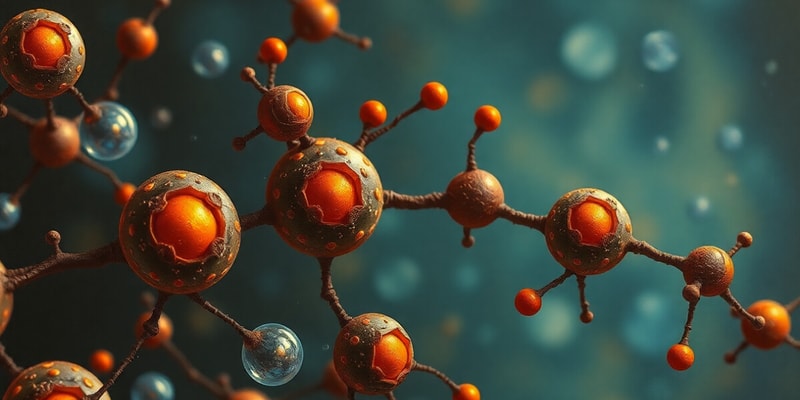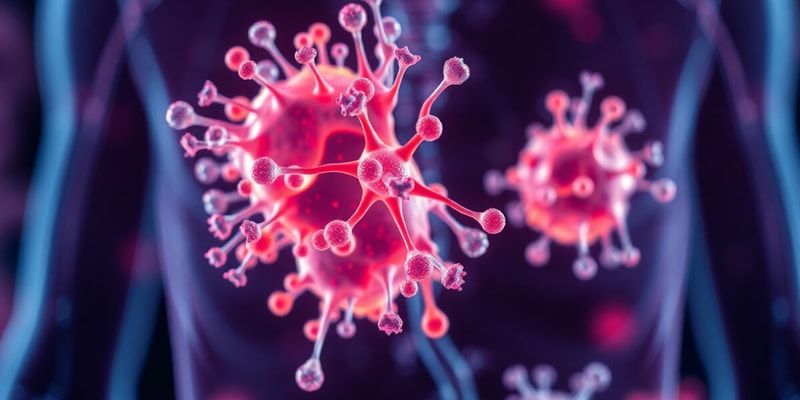Podcast
Questions and Answers
Which interaction between organisms is characterized by one organism benefiting at the expense of another?
Which interaction between organisms is characterized by one organism benefiting at the expense of another?
What is a primary impact of human activity on ecosystems?
What is a primary impact of human activity on ecosystems?
Which term describes the process through which organisms become better suited to their environment over time?
Which term describes the process through which organisms become better suited to their environment over time?
What is the primary purpose of classification in biology?
What is the primary purpose of classification in biology?
Signup and view all the answers
How does biological diversity contribute to ecosystem functioning?
How does biological diversity contribute to ecosystem functioning?
Signup and view all the answers
Which biological macromolecule is primarily responsible for storing genetic information?
Which biological macromolecule is primarily responsible for storing genetic information?
Signup and view all the answers
What is the main difference between prokaryotic and eukaryotic cells?
What is the main difference between prokaryotic and eukaryotic cells?
Signup and view all the answers
Which process describes the movement of water across a semipermeable membrane?
Which process describes the movement of water across a semipermeable membrane?
Signup and view all the answers
What are ribosomes primarily involved in within the cell?
What are ribosomes primarily involved in within the cell?
Signup and view all the answers
In Mendelian genetics, what does a homozygous genotype indicate?
In Mendelian genetics, what does a homozygous genotype indicate?
Signup and view all the answers
Which organelle is known as the powerhouse of the cell?
Which organelle is known as the powerhouse of the cell?
Signup and view all the answers
What is the role of the endoplasmic reticulum in a cell?
What is the role of the endoplasmic reticulum in a cell?
Signup and view all the answers
Which of the following best describes the focus of ecology?
Which of the following best describes the focus of ecology?
Signup and view all the answers
Study Notes
Introduction to Biology
- Biology is the study of life and living organisms.
- It encompasses a vast range of topics, from the smallest microorganisms to the largest mammals.
- Studying biology helps us understand how living things work, interact with their environment, and evolve.
- Key areas of biology include cell biology, genetics, ecology, evolution, and more.
Biological Molecules
- Key building blocks of life include carbohydrates, lipids, proteins, and nucleic acids.
- Carbohydrates are sugars; examples are glucose and starch. They provide energy and structure.
- Lipids are fats and oils; they store energy and form cell membranes. Important lipids include phospholipids and triglycerides.
- Proteins are made of amino acids; they perform diverse functions such as enzymes, hormones, and structural components.
- Nucleic acids, DNA and RNA, carry genetic information. DNA stores instructions for building proteins and RNA plays a key role in protein synthesis.
Cells
- The cell is the basic unit of life.
- All living things are composed of cells, either single-celled or multicellular.
- Cells have various structures and organelles with specific functions.
- Examples of key organelles include: the nucleus (controls cell activities), mitochondria (powerhouse of the cell, produces energy), ribosomes (make proteins), and the endoplasmic reticulum (involved in protein and lipid synthesis).
- Prokaryotic cells are simpler, and lack a nucleus. Examples include bacteria.
- Eukaryotic cells are more complex and have a nucleus and other organelles. Examples include animal and plant cells.
Cell Processes
- Cell processes are the activities performed by cells to survive and reproduce.
- Examples include: diffusion (movement of substances across a membrane), osmosis (movement of water across a membrane), photosynthesis (process plants use to make food), cellular respiration (process cells use to get energy).
- Cell division (mitosis & meiosis): ensures growth, repair, and reproduction.
Genetics
- Genetics is the study of heredity.
- Genes are segments of DNA that carry instructions for traits.
- Traits are characteristics of an organism.
- Chromosomes contain genes and control the expression of inherited traits.
- Mendelian genetics describes patterns of inheritance of individual genes.
- Modern genetics investigates DNA, its structure, and the function of genes.
Ecology
- Ecology studies the relationship between organisms and their environment.
- Interactions between organisms and their environment are complex, encompassing topics such as:
- Relationships like predation, competition, parasitism, and mutualism.
- Impacts of human activity.
- Different ecosystems.
- Food chains show the flow of energy in an ecosystem.
- Food webs show interconnectedness of multiple food chains
Evolution
- Evolution is the process by which life on Earth has changed over time.
- Natural selection is a key mechanism of evolution.
- Adaptation allows organisms to survive and reproduce in their environment.
Classification
- Classification is the arrangement of organisms into groups based on shared characteristics.
- Organisms are organized into a hierarchical system based on evolutionary relationships.
Biological Diversity
- The variety of life on Earth, both in terms of different species, and genetic variations within species.
- The diversity of life is essential to the health and functioning of ecosystems.
Studying That Suits You
Use AI to generate personalized quizzes and flashcards to suit your learning preferences.
Description
Test your knowledge of the basic concepts in biology, including biological molecules and the functions of cells. This quiz covers essential topics from the structure of carbohydrates, lipids, proteins, nucleic acids, and their roles in life. Challenge yourself and see how well you understand the foundation of living organisms.




